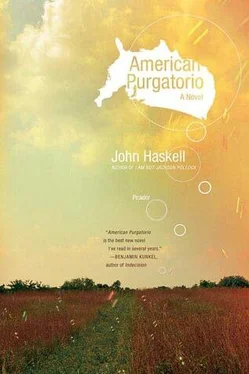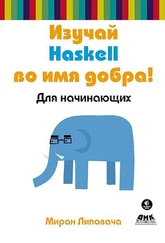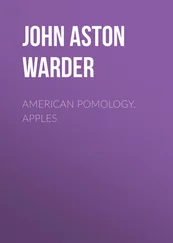John Haskell - American Purgatorio
Здесь есть возможность читать онлайн «John Haskell - American Purgatorio» весь текст электронной книги совершенно бесплатно (целиком полную версию без сокращений). В некоторых случаях можно слушать аудио, скачать через торрент в формате fb2 и присутствует краткое содержание. Год выпуска: 2006, Издательство: Picador, Жанр: Современная проза, на английском языке. Описание произведения, (предисловие) а так же отзывы посетителей доступны на портале библиотеки ЛибКат.
- Название:American Purgatorio
- Автор:
- Издательство:Picador
- Жанр:
- Год:2006
- ISBN:нет данных
- Рейтинг книги:3 / 5. Голосов: 1
-
Избранное:Добавить в избранное
- Отзывы:
-
Ваша оценка:
- 60
- 1
- 2
- 3
- 4
- 5
American Purgatorio: краткое содержание, описание и аннотация
Предлагаем к чтению аннотацию, описание, краткое содержание или предисловие (зависит от того, что написал сам автор книги «American Purgatorio»). Если вы не нашли необходимую информацию о книге — напишите в комментариях, мы постараемся отыскать её.
Los Angeles Times
American Purgatorio — читать онлайн бесплатно полную книгу (весь текст) целиком
Ниже представлен текст книги, разбитый по страницам. Система сохранения места последней прочитанной страницы, позволяет с удобством читать онлайн бесплатно книгу «American Purgatorio», без необходимости каждый раз заново искать на чём Вы остановились. Поставьте закладку, и сможете в любой момент перейти на страницу, на которой закончили чтение.
Интервал:
Закладка:
I watch her for a minute and I remember, from Alex, in Kentucky, one pose; it’s the only pose I know but it’s my favorite pose. I lie on my back, next to her, my legs stretched out and relaxed, my arms on the rug away from my hips, my eyes closed, my mind empty.
Not empty, but confined to my body, which is sinking into the floor. My eyes are relaxed. My mind is relaxed.
And then I stand up. Slowly. I roll over, then stand up, vertebra by vertebra, as much as I can. Once I’m up I notice that my senses seem to be functioning better. I can see with a little more acuity. I notice a dictionary on the stereo bookshelf. Two dictionaries, a paperback version next to a red hardcover. I pick up the frayed brown paperback, thumbing through, looking at the words and the black-and-white drawings beside the words. I ask Linda, standing on her head against the wall, if I can borrow the book.
She says nothing.
“I mean can I have it?”
I interpret her silence to mean I should take it.
I’m standing next to her, and I want to thank her, but because she’s upside down, I’m standing next to her legs floating in the air. So I reach over — her ankles are showing — I reach over and I kiss her, lightly, on the skin of her ankle. And then I go to my room.
I sit on the bed.
My body is there. I can still feel my body, my butt bones on the mattress. I can feel my feet on the rug. I can feel the book in my hands, my fingers holding the weight of the book. I don’t want to fade away. Fading away is frightening. I have things to do before I fade away.
So I stand up. I put on one of Geoff’s dark blue sports coats, and in my borrowed clothes I leave the house. They live a few blocks from the water and I walk to the edge of the water, holding the dictionary against my wrist. When I watch the waves, although there are surfers riding the waves, all I can see is the water. The boardwalk, at that point along the coast, is just a sidewalk with cyclists and walkers and people on skates. I walk along with them, south toward the lifeguard tower, and keep walking, down past the coffee stand and along the sandy cement, the girls in bathing suits and boys in shorts. Surprisingly, I’m not in a hurry.
When I get to the Surfer Hotel I find the door to Polino’s shack, the air-conditioning room where Polino and I used to sleep, and of course the door is locked. I find a thin piece of aluminum siding at the construction site next door and fit it between the door and the jamb and with a little jiggling I’m able to slip back the bolt on the door. I walk inside where it’s cool, into the cinder-block hum of machinery. I go to the place behind the heater and find the box with the candle and the rolled-up blankets. I place the dictionary on the ground in front of the box, next to a valve with a tag hanging from the metal thread. I leave the book. No note, just the book.
4
I’m standing on a sidewalk at the side of a large supermarket. Cars are coming out of an underground parking garage. The world, as I notice it around me, has a clarity. Everything is clear, but also slightly removed. The outlines are sharp but the things themselves — the palm tree growing in the grass, the oil stains in the street, the sound of a motorcycle — all the things in the world are separate from me. Separate, and also the same. There’s a certain pleasure in standing there, seeing the world in front of me, and not constantly wanting something from it all the time.
I would almost call it tranquillity, this lack of desire. Everything is just moving or not moving according to some plan, and because it’s not my plan, and because I have no vested interest in the outcome, it seems perfect. And I want it to last. I want to keep feeling the perfection around me, and in me, but it can’t go on forever, I think. Not like this.
So I stand there, and whatever it is, I feel it. I don’t try to feel it, I just let it happen, and when I do, yes, the peace is there. The tranquillity is there, but I don’t know. Is the peace of it all being over better than being in the world?
Wanting life is life, and I’m not quite ready to give it up. I don’t want to be dead. I can adjust to anything, anything except not being. I still want to see what’s going to happen. Maybe I’m greedy, but my habit is to hold on, so that’s what I do.
And that’s when the tranquillity starts to fade. I liked that tranquillity, but now it’s replaced by the opposite of tranquillity, desire, a desire for the world. Without the world, and the tumult of the world, there’s nothing. Not nothing ness. Just nothing. Without the world penetrating my senses, without that stimulation, there’s only numbness. And although that numbness has a tranquillity component, it also has a black hole component. Which is why, as usual, I start walking.
I don’t know what else to do. In an effort to keep from losing the world I wander along Mission Boulevard, along the narrow sidewalk, past the small pastel houses crowded together. I walk for what seems like a long time, until I come to the parking lot of the Mission Beach amusement park. I thought I was wandering aimlessly but maybe I had in my mind all along the idea of riding the roller coaster, because that’s where I go.
Geoff had given me some spending money and so in the middle of the stalls and rides I find the ticket booth, buy a small red ticket, and wait in a line. As I’m standing there I notice a man who looks like my father, and who may well be my father, smoking a cigarette against a chain-link fence. Because my father is dead I watch this man as he takes a last puff, throws the butt on the ground, and walks away.
The line moves forward and a man in a sweatshirt tells a teenager in front of me to step into one of the cars. I step into an empty car behind him, and a metal bar is lowered over my chest. I’m sitting in the seat, and my car, part of a train of cars, starts moving. It’s being pulled, slowly and deliberately, up the ramp, up to the highest point. I can hear the old metal wheels grating on the track. Then the silence of anticipation.
And then the car starts its plummet, and the rest of the ride is filled with the screams of excitement. But not my screams. During the ride, instead of excitement, I feel nostalgia. For life. This is life. You can’t get much more adrenaline in life than this. And although the ride doesn’t take much time, at the end of it I’m crying, not over the absence of that life, but over its existence.
5
It’s the middle of the day and people are out, walking in the sun. I’m walking with them, watching them as they go about building their lives. I remember back to who I was with Anne, who I wanted to be with Anne, trying to build my life — and our life together — thinking I was building it, happy that I was there in the world, with her, although at the time I wasn’t thinking about it, I was just doing it. It was my dream, and these people, I think, are also dreaming. Not lost in a dream, but dreaming of what can happen, dreaming of what life will mean, of who they want to be. Everyone wants to be something. I wanted to be something, but now I’ve forgotten what it was I wanted to be. I know it was something, something good, something that would make the world better, something that would make Anne happy.
Or maybe only I wanted to be happy? I’m not so sure. I’m not so sure my attraction to happiness included anyone other than me. I’m not convinced I wasn’t alone the whole time Anne and I were together.
In New Jersey we were together. I know that. At the gas station. We’d been driving together, talking together, crossing the bridge together. Dreaming even. We had dreams: of children, of success, of friends, the garden, old age. Not too much about old age. We weren’t there yet, but it was part of the dream, part of the implied dream we were dreaming together.
Читать дальшеИнтервал:
Закладка:
Похожие книги на «American Purgatorio»
Представляем Вашему вниманию похожие книги на «American Purgatorio» списком для выбора. Мы отобрали схожую по названию и смыслу литературу в надежде предоставить читателям больше вариантов отыскать новые, интересные, ещё непрочитанные произведения.
Обсуждение, отзывы о книге «American Purgatorio» и просто собственные мнения читателей. Оставьте ваши комментарии, напишите, что Вы думаете о произведении, его смысле или главных героях. Укажите что конкретно понравилось, а что нет, и почему Вы так считаете.











